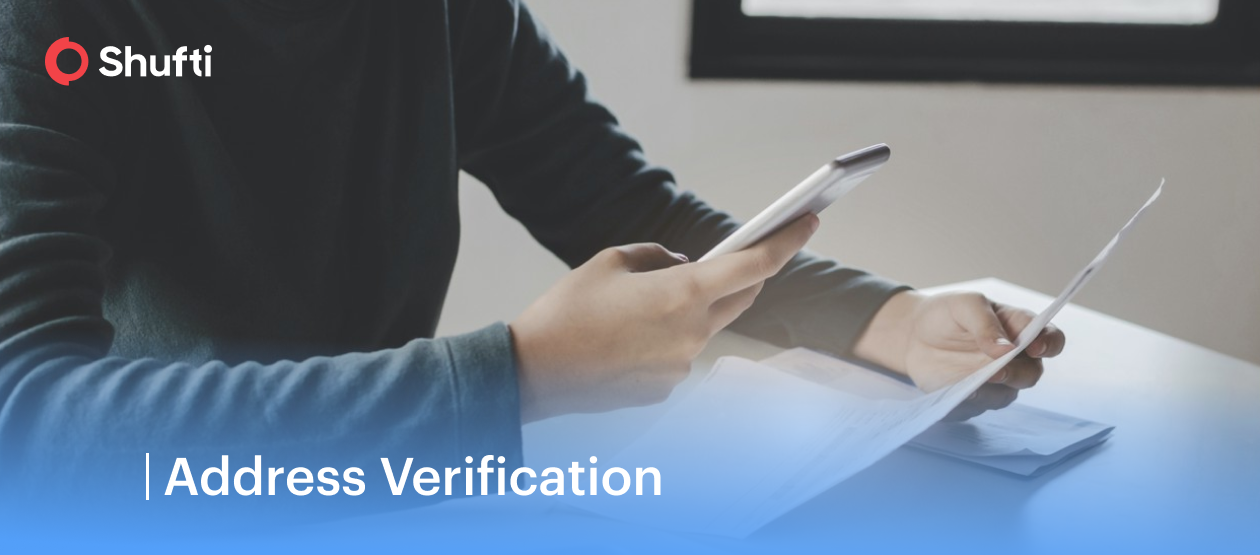Address Verification

Address verification is an essential aspect of modern identity verification. It confirms a customer’s residential or business address before a transaction is completed or a service is provided. As fraud becomes more complex, businesses in several industries are using address verification to prevent identity theft, meet regulatory requirements, and protect both users and systems.
How Address Verification Works
Address verification is designed to be fast, accurate, and compliant with global standards. At Shufti, the process is completed in three simple steps with an impressive accuracy rate of 98.67%.
- Document and Identity Submission
The user provides a selfie or live photo along with a government issued ID. Biometric facial recognition technology verifies that the person matches the photo on the ID.
- Proof of Address Submission
A secondary document is submitted to confirm the customer’s address. This may include a utility bill, bank statement, tax notice, or rental contract. The document must be recent, usually no older than 90 days.
- Verification and Results
The address listed on the ID is cross-checked against the secondary document. The results are delivered through Shufti’s API and also accessible in the back office, along with a time-stamped verification report.
Accepted Proof of Address Documents
To ensure compliance and reliability, proof of address (PoA) documents must be:
- Official and unaltered
- Clearly showing the user’s name and address
- Issued within the last 90 days
Commonly accepted documents include:
- Utility bills (gas, electric, water)
- Bank or credit card statements
- Government-issued letters
- Lease or rental agreements
Outdated or manipulated documents are rejected automatically to minimize potential risk.
Industries That Rely on Address Verification
Regulatory authorities and industry bodies have made address verification a more common requirement across many sectors. Some of the key industries where this process is essential include:
E-Commerce and Retail
Online retailers face frequent cases of chargebacks, order fraud, and delivery errors. Address verification helps confirm the legitimacy of shipping information and reduces the risk of fraudulent transactions. It also plays a role in improving the accuracy of deliveries and minimizing costly returns.
Financial Services
Banks, fintech startups, and payment processors are frequent targets of identity fraud. Criminals may use stolen identities to open fake accounts during money laundering operations or when financing illegal activities. By verifying both identity and address, financial institutions can prevent account misuse and comply with anti-money laundering (AML) regulations.
Rental and Sharing Services
Peer-to-peer platforms and property rental services depend on accurate identity information. Verifying the address of renters or property owners improves platform security and builds trust between users. It also protects businesses from fraud or misuse of services.
Marketplaces and Gig Economy Platforms
Digital marketplaces and freelance platforms benefit from address verification in several ways. It ensures accurate user information, supports delivery logistics, and helps enforce location-based rules or pricing models. It also contributes to platform credibility and safety.
Benefits of Address Verification
The value of address verification extends beyond just compliance. It strengthens business operations, enhances customer trust, and improves long term performance.
1. Fraud Prevention
Online fraud is on the rise and bad actors often use fake addresses to exploit systems. In the e-commerce sector, for every $1 lost to chargebacks, companies lose about $2.40 when accounting for fees and associated costs. Address verification acts as a filter that blocks suspicious activity before damage is done.
2. Fewer Returns and Failed Deliveries
A significant number of returned online sales are due to an incorrect shipping address. Address verification confirms the accuracy of delivery details before shipment, saving businesses time and money.
3. Better Customer Experience
Fast and accurate verification improves onboarding and reduces friction. When a customer’ address is validated in real time, businesses can ensure smooth delivery, maintain clear communication, and avoid frustrating service disruptions.
4. Stronger Compliance with Global Regulations
Authorities around the world are tightening their KYC and AML regulations. Between the EU’s Sixth Anti-Money Laundering Directive (6AMLD) and guidelines from the Financial Action Task Force (FATF), businesses must implement robust identity checks. Address verification helps fulfil these obligations and shields businesses from penalties and enforcement actions.
5. Efficient Internal Operations
Automated address verification eliminates the need for manual checks, which are often low and error-prone. With faster onboarding, reduced verification time, and consistent data quality, teams can work more efficiently and scale with complete confidence.
Current Trends in Address Verification
The field of address verification is evolving rapidly. Here are some of the latest trends shaping the future of this essential service.
AI and Machine Learning
Artificial intelligence is now widely used to assess document legitimacy, detect tampering, and flag synthetic identities. These tools increase accuracy while reducing human error and review time.
Global Address Format Support
International businesses need verification tools that can interpret postal formats across different countries. Today’s leading solutions include global address normalization, which ensures that addresses are correctly formatted and verified, regardless of language or region.
Integration with Government Databases
In regions where digital identity frameworks exist, address verification is increasingly linked to national databases. This allows for instant cross-checking of identity and address information, reducing reliance on physical documents and improving reliability.
Final Thoughts
Address verification has become a vital tool for organizations looking to operate securely and responsibly in a digital-first world. It supports trusted interactions between users and services while helping companies maintain the integrity of their systems. As more transactions move online, reliable address checks become foundational to their success.
By combining automation with intelligent data validation, businesses can better anticipate risks, streamline onboarding, and align with global compliance expectations. Whether serving customers locally or across borders, adopting a verified address layer offers real advantages in efficiency, accuracy, and protection. In an age of growing threat, verifying where people live helps confirm who they really are.

 Explore Now
Explore Now






